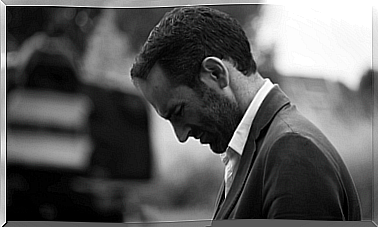You Have The Right To Get Angry, To Protest And To Feel Unwell

Even if we want to convince you otherwise, you have this right: you can get angry. It is also an emotional need. Feeling the annoyance, indignation and anger of confusion is the first step in facing a problem. Consider that if you limit yourself to swallowing your anger over and over again without facing what hurts you, you are seriously damaging your self-esteem. Let it be clear: allowing yourself to feel nervous does not mean losing control, nor showing your fragility.Often times, influenced by others, we tend to confuse terms and ideas. We know that whoever pisses us off dominates us, but that’s not why we have to deactivate this negative emotionality in order to hide it, refuse it and deny it. Anger has a very clear objective: to invite us to resolve a concrete threat.
“The most painful discomforts are the ones we can’t complain about.”
-Marquis de Custine-
On the other hand, we all know that everyday life always tests our emotional balance. There will be people who will live eternally offended and those who will never take anything personal. Each of us advances through a specific filter, with which we let certain emotions and thoughts pass or not.
However, everything has a limit and an impassable border. We are talking about this barrier that often arises arbitrarily to vilify our self-esteem, to undo our emotional integrity, or to manipulate us. Anger has a purpose and expressing it respectfully at the right time and at the right time is cathartic and very healthy.
We suggest you think about this.
Getting angry, protesting and giving voice to your emotions also helps
As curious as it may seem, there are very few books that explain or argue about the benefits of nervousness or indignation. Traditionally, this type of emotion has always been associated with anger and lack of control, lack of temperance, tact and discernment when dealing with a certain annoyance.
But you should know that, just like in the grieving process, it is necessary to take the step towards accepting your own emotions, before channeling them, and transforming them. Knowing how I’m feeling and why I’m feeling it is vital to solving an emotional crusade. We said the bibliography on this topic is slim, but luckily there is such an interesting and enlightening book: Annoying (2011), by scientists Joe Palca and Flora Lichtman.
In this work, we deepen the subject of nervousness from a multidisciplinary approach where neuroscience, sociology, anthropology and psychology are present. The first thing these researchers tell us is that we often compare nervousness to anger, frustration, or loathing towards someone or something. This is not true and the experts here propose to understand nervousness as unique and exclusive emotions.
Anger never happens because of a one-off act. It is an accumulation of ‘many small acts which form a whole’. It’s like a mosquito that flies around our room every night, so much so that we can’t sleep anymore and we are unable to focus our attention on anything other than that mosquito. However, and this is where the most important thing comes in: without embarrassment, there is no possibility of change. That is, this negative emotion has a purpose: it wants us to take action.
Getting angry in a smart way
Charles Darwin once said that negative emotions, like fear and anger, are warnings that lead us to engage in appropriate behaviors in order to avoid or shy away from danger. Paying attention to what bothers us, makes us unworthy, and makes us lose our temper is proof of self-understanding. Acting consistently with these emotions undoubtedly demonstrates our emotional intelligence.
“Stay away from the little people who wish to shrink your life and your ambitions: these are the most dangerous.”
-Mark Twain-
Let us now see how we should act in these cases and what are the aspects that are important to delimit in order to understand this.
The 4 laws of intelligent nervousness
The first law, and not the least important, is to understand that anyone who lives eternally offended is doomed to eternal calamity. There are battles that do not deserve to be fought, there are aspects that do not deserve our attention and conversations that are better not to start or not to nurture.
- Get upset about what really threatens your personal balance, speak out against what attacks your self-esteem, and stand up firmly when someone dares to hurt you.
- The second law refers to something obvious: defending yourself with respect is possible. Arguing assertively and without verbally attacking those in front of us is essential. Something we can and should do through Emotional Intelligence.
- The third law has very clear steps that must be internalized: listen, feel, clarify and act. In other words, first listen to the stimulation that offends or hurts you. Then become aware of your emotions, and feel the nervousness. Later, take a breath and put your priorities in order.
“I have to act and set limits by meaning that I don’t want to be treated that way. I must not let the nervousness immobilize me to the point of preventing me from thinking. I will use it to act intelligently. ”
- The fourth and final law to get angry smart is learning. Every situation resolved, faced or every need defended must teach us that inactivity, silence and swallowing emotions hurts and makes you sick.
You shouldn’t be afraid of negative emotions. On the contrary, understanding and managing them is the authentic key to our personal growth.
Images of Nicoletta Ceccoli









